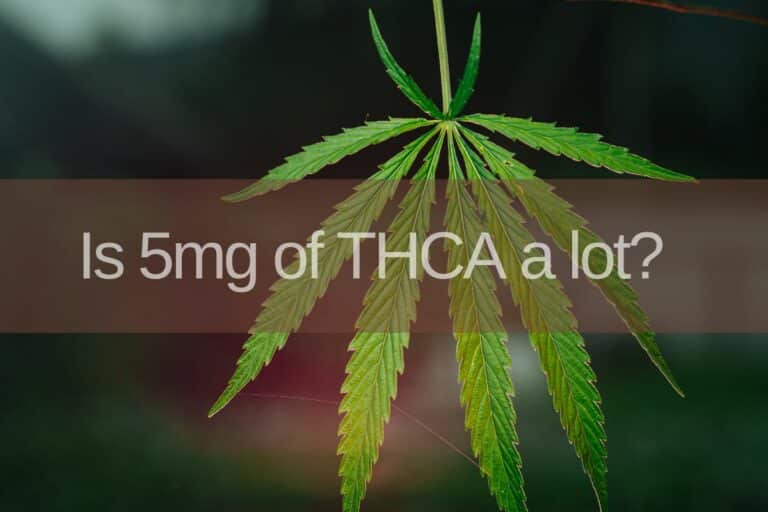What Does THCa Do to the Brain? Unveiling Cannabinoid Effects
Jump into the magic land of THCa, a super-charged element hiding within the lush greenery of the cannabis world. Picture it as THC’s shy family member, the one in weed that usually makes people sky-high. But, before heat works its enchantment and morphs THCa into the well-known THC, it chills out, handing out health goodies without the buzz. Imagine having a secret power that, rather than sending you soaring high, keeps you fit as a fiddle. If snagging positive energy and dodging sickness is up your alley, THCa could be your secret weapon. Brace yourself to uncover the mysteries of this hidden champion and maybe shift the odds in your favor. Stay here, and you may discover a treasure trove of health that’s been off the radar.
Recent research has indicated that THCa may act as a potent agonist for PPARγ, a receptor in the brain involved in regulating inflammation and neurogenesis. This suggests that THCa could have neuroprotective activity beneficial for conditions characterized by neuroinflammation. It appears that THCa could down-regulate inflammatory genes in the brain, representing a significant step forward in understanding how compounds in cannabis might contribute to brain health.
Table of contents
Moreover, it’s become evident that cannabinoids like THCa might influence brain function in ways separate from the psychoactive pathways typically associated with cannabis use. For example, studies involving murine models have revealed that THCa may protect dopaminergic neurons, which are crucial in the management of neurodegenerative diseases like Parkinson’s. With an increasing interest in the medical applications of cannabis, understanding the effects of THCa on your brain is becoming increasingly pertinent.
THCa and the Brain Chemistry
THCa, short for tetrahydrocannabinolic acid, is a non-psychoactive cannabinoid precursor found in cannabis. When you consider its impact on the brain, it’s critical to understand how it interacts with various brain systems.
Interaction with Cannabinoid Receptors
THCa affects your brain by interacting with cannabinoid receptors, specifically CB1 receptors which are predominant in the brain. Unlike THC, THCa has a different affinity for these receptors, which may contribute to its unique effects, potentially encompassing neuroprotective properties. These interactions can influence your brain’s endocannabinoid system, which plays a role in regulating various functions, including memory, learning, and movement.
Influence on Neurotransmitter Release
While THCa doesn’t bind to cannabinoid receptors as effectively as THC, it might influence neurotransmitter release in your brain. In particular, THCa has been suggested to modulate the release of glutamate, a neurotransmitter critical for cognitive functions, including learning and attention. This modulation can affect the communication between neurons and may have implications for neurodegenerative diseases.
Effects on Brain Development and Cognitive Functions
Your brain’s development and cognitive functions such as thinking, behavior, and IQ could be influenced by the presence of THCa. Some studies point to cannabinoids, including THCa, as factors that might alter neurodevelopmental processes. However, it is imperative to approach this research with caution as correlating THCa with changes in brain development and cognition necessitates a thorough understanding of dosage and context according to the existing body of research.
It’s important to note that most studies on THCa’s impact on the brain are preliminary, and more extensive clinical research is required to draw definitive conclusions about its effects on cognition, memory, and learning capabilities.
Decarboxylation and Activation of THCa

Before exploring the impact of THCa on the brain, it’s crucial to understand the fundamental process of decarboxylation and how it activates the compound to affect your mental state.
The Process of Decarboxylation
Decarboxylation is a chemical reaction involving the removal of a carboxyl group, facilitated by heat. When THCa (tetrahydrocannabinolic acid) is decarboxylated, it loses a carbon atom from its chain, effectively converting into tetrahydrocannabinol (THC). This process can occur naturally over time or can be induced more quickly by exposing THCa to heat through methods such as smoking, vaping, or cooking.
Conversion to THC and Psychoactive Effects
Upon decarboxylation, THC becomes the primary psychoactive component. The transformation introduces psychoactive effects because THC is able to interact with the endocannabinoid system in your brain, particularly affecting the receptors that influence pleasure, memory, and cognition. The psychoactive properties of THC are typically associated with the “high” that marijuana users experience, distinguishing it from the non-psychoactive THCa form. Notably, THC’s psychoactive effects can vary in intensity and duration depending on factors such as the method of consumption and individual physiology.
Therapeutic Effects of THCa

THCa, or tetrahydrocannabinolic acid, is a non-psychoactive cannabinoid with a variety of therapeutic benefits for your brain, including anti-inflammatory effects, neuroprotection, and pain management.
Anti-Inflammatory Properties
Research suggests that THCa has significant anti-inflammatory capabilities, which may be beneficial for conditions accompanied by inflammation. By interacting with key receptors in your brain, THCa can help alleviate inflammation. This property is particularly relevant for diseases like multiple sclerosis, where inflammation plays a critical role in its pathology.
Neuroprotective Benefits
Your brain’s health can also benefit from the neuroprotective effects of THCa. Studies indicate that THCa can help protect brain cells from damage and support brain health, which is crucial for diseases such as Parkinson’s disease. It functions by modulating mechanisms that lead to neurodegeneration, providing a potential safeguard against brain cell loss.
Pain Relief and Nausea Management
When it comes to managing pain and nausea, THCa shows promise. It acts as an antiemetic, helping to reduce nausea and stimulate appetite, a common need for individuals undergoing treatments like chemotherapy. Additionally, its pain-relieving properties might help alleviate chronic pain without the psychoactive effects associated with THC. This dual action makes THCa a potential therapeutic option for comprehensive symptom management.
Non-Psychoactive Usage of THCa
THCa, or tetrahydrocannabinolic acid, is a non-psychoactive compound found in the raw cannabis plant. It does not produce the “high” commonly associated with THC, making it a point of interest for those seeking the therapeutic benefits of cannabis without the psychoactive effects.
Unheated Cannabis Methods
The most natural way to consume THCa is through unheated cannabis methods. One such method is juicing raw cannabis leaves, which allows you to incorporate THCa into your diet similar to other leafy greens. Juicing preserves the raw cannabinoids and terpenes that can be lost during decarboxylation – the process that converts THCa to THC through heating. Alongside juicing, you might also consider adding raw cannabis to smoothies for a convenient and healthy option to consume THCa.
Products with THCa
In the market, a variety of THCa products cater to those looking to harness its benefits. Tinctures, which are liquid extracts, enable precise dosing and can be used sublingually or added to food and beverages. Topicals and massage products with THCa are designed for localized relief, and because they are not psychoactive, they are particularly appealing for everyday use to manage discomfort. Raw cannabis flower, concentrates, and pre-filled vape cartridges can also retain high levels of THCa if they remain unheated. Lastly, THCa is present in certain edibles designed to provide potential therapeutic effects without the high.
Potential Risks and Side Effects

When considering the use of THCa, it’s crucial to understand its potential risks and side effects on the brain, as well as how it compares to other cannabinoids. While some effects may overlap with more well-known compounds like THC, THCa has its own profile.
Long-term Impact on the Brain
Long-term use of cannabis, which contains THCa, could lead to changes in your brain function. Studies suggest a potential association between prolonged marijuana use and impairments in areas such as memory, attention, and coordination. Specifically, the impact on your brain’s receptors from consistent exposure to cannabinoids like THCa may alter neural connectivity over time. These alterations can affect cognitive abilities and potentially increase the risk of developing psychiatric disorders.
Comparison with Other Cannabinoids
Comparing THCa with other cannabinoids like tetrahydrocannabinol (THC) and cannabidiol (CBD) reveals different risk profiles. THC, the main psychoactive component of cannabis, binds directly to brain receptors and can lead to immediate psychoactive effects, including impaired coordination and altered brain function. In contrast, THCa is non-psychoactive and does not bind to these receptors in the same manner. However, THCa can convert into THC upon heating, which may entail the risks associated with THC consumption. Meanwhile, CBD is known for its potential therapeutic effects without the psychoactive side effects of THC, suggesting it may have a safer profile concerning mental health outcomes. Each cannabinoid’s legal status can also influence its accessibility and consequently potential side effects due to unregulated use.
Legal and Regulatory Considerations

When exploring the legal and regulatory considerations for THCa, you will find a complex landscape. The legality of THCa and its relation to drug testing varies globally, influenced by how it is treated under the law due to its close relation to THC, the main psychoactive component in cannabis.
Legality of THCa Around the World
THCa, or tetrahydrocannabinolic acid, is a non-psychoactive precursor to THC found in raw cannabis plants. Legality varies by country and often hinges on whether THCa is considered the same as or separate from THC. In regions where cannabis is illegal, THCa may also be prohibited, as it can be converted to THC upon decarboxylation, which occurs when cannabis is heated. Some regions have more nuanced laws:
- In the United States, the legal status of THCa is murky. While the 2018 Farm Bill legalized hemp-derived cannabinoids, which could include THCa, its potential to convert to THC might classify it as a controlled substance.
- Canada has legalized cannabis for recreational and medicinal use, which includes THCa.
- In the European Union, the legality varies between countries, with some allowing limited use of cannabis derivatives and others maintaining strict prohibitions.
Countries and regions may have their own regulations regarding the handling, production, and consumption of THCa, so it’s essential to check the local laws.
Implications for Drug Testing
For those subjected to drug testing, understanding the implications of THCa presence is crucial. Standard drug tests typically screen for THC, not THCa. However, because THCa can convert to THC through decarboxylation, there is a potential for a positive test if a product containing THCa is consumed and metabolized into THC in the body.
- If you’re using a product that contains THCa, be aware that exposure to heat could lead to the presence of THC in your system.
- Legal consequences could ensue if you test positive for THC, depending on the laws of your jurisdiction.
In summary, the legalities surrounding THCa are closely tied to the laws on THC and cannabis. Its potential conversion to THC makes it a subject of concern in drug testing scenarios. Always stay informed about your local cannabis regulations to navigate these considerations properly.
Frequently Asked Questions
In this section, you’ll find precise answers to common inquiries about THCa’s impact on the brain and its potential health implications.
What are the potential health benefits associated with THCa?
THCa is the non-psychoactive precursor to THC found in raw cannabis plants. It has been observed to have anti-inflammatory and neuroprotective properties. Investigations into the affinity of THCa for brain receptors suggest it might have therapeutic potential without the psychoactive effects of THC.
How does THCa compare to Delta-9-THC in terms of effects on the brain?
THCa does not produce the psychoactive effects that Delta-9-THC does because it does not readily bind to the same cannabinoid receptors in the brain. When THCa is decarboxylated to THC, it can then exert the well-documented psychoactive effects.
Can THCa be considered a psychoactive substance?
No, THCa itself is not considered psychoactive because it does not have a significant effect on the mind or behavior. It does not cause the “high” associated with THC. In discussions about non-psychoactive cannabinoids, THCa is often highlighted for its potential health benefits without the psychoactive impact.
What are the known side effects of consuming THCa?
The side effects of consuming THCa are not well-documented, largely because it is not psychoactive and has been less studied than THC. However, like all substances, it may have unknown or individual-specific reactions that are yet to be fully understood.
Is it safe to consume THCa through smoking, and what should one be aware of?
When cannabis is smoked, THCa is converted to THC due to the heat, which then produces psychoactive effects. Hence, smoking would not allow you to consume THCa in its raw form. Caution is advised, as smoking cannabis leads to the inhalation of other compounds that may have adverse effects on health.
How does THCa interact with the brain, and what are its mechanistic effects?
THCa is believed to work by interacting with cannabinoid receptors in the brain, but with a much lower affinity than THC. Initial studies suggest mechanistic effects such as anti-inflammatory and neuroprotective actions, but the exact pathways of how THCa affects brain function are still being researched.







